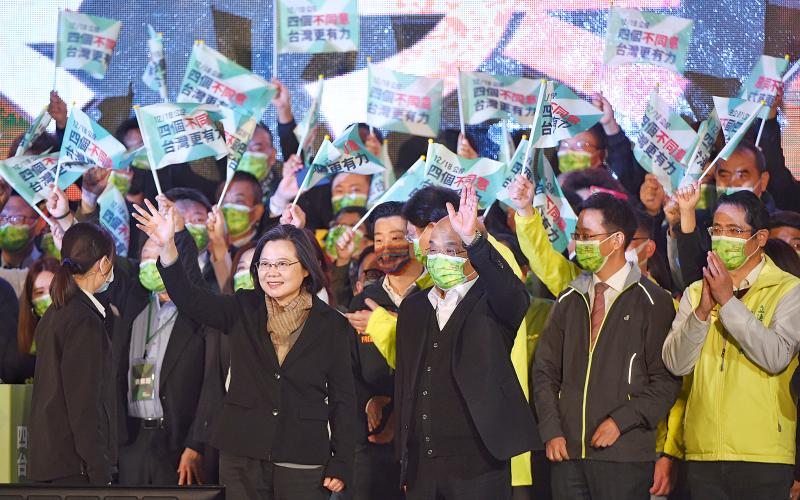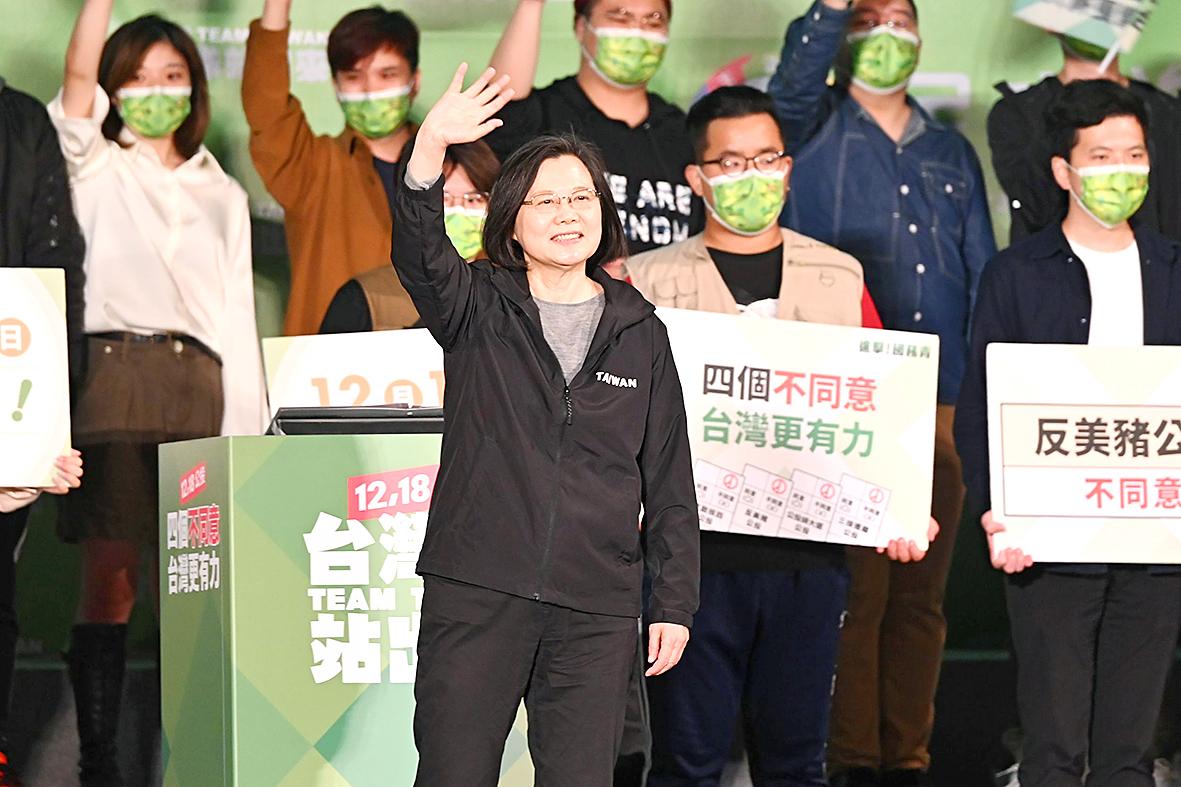It always nice to bask in the warm afterglow of another Chinese Nationalist Party (KMT) fubar, this time the defeat of all four of the referendums that it had promoted and the Democratic Progressive Party (DPP) had opposed.
The DPP displayed competence, changing strategies when it needed to and effectively motivating its somewhat younger base than the KMT, a base that is more likely to live far from where it has household registry than the older KMT base and thus, is more difficult to get out. Kudos to the DPP.
This was a performance that Taiwan needed: the ractopamine pork referendum might have caused unnecessary trouble with US, while re-opening the dilapidated and dangerous fourth nuclear plant was simply a bad idea. A defeat for the DPP might have invigorated the KMT as well; certainly it would have given that ally of Beijing an additional club with which to bash the pro-Taiwan side.

Photo: Liu Hsin-te, Taipei Times
Years ago, the midwife of Taiwan’s democracy, Lee Teng-hui (李登輝), remarked that if he was Moses leading Taiwan out of bondage, then Chen Shui-bian (陳水扁), who succeeded him as president, was Joshua, leading Taiwan into the promised land. Lee, who used to criss-cross the island giving sermons on humility and public service, understood his place in history. But if the story of Taiwan’s democratization contains a Joshua to Lee’s Moses, that figure is President Tsai Ing-wen (蔡英文), not Chen.
CULTIVATING RELATIONS
At home, Tsai has presided over a consolidation of the nation’s democracy with successful, clean, regular, even dull elections. Abroad, her calm demeanor and cultivation of good relations with the US and Japan and pursuit of relations with the world by other means has elevated Taiwan’s stance in the world, such as its city-to-city initiatives, highlighted last Wednesday in the Taipei Times (“Cities can expand Taiwan’s role,” Marcin Jerzewski and Huynh Tam Sang).

Photo: Lee Hui-chou, Taipei Times
As much as by what she has done, Tsai’s success has been defined by what she has not done, by things that didn’t happen. In February of 2008, as his presidency was in its final year, Chen flew out to Itu Aba Island (Taiping Island, 太平島), ostensibly for the opening ceremony of an airstrip there. It was a useless stunt that drew unnecessary attention to the island claims of the Republic of China (ROC). A piece in the international media called it a “stick-in-your-eye move by Chen” to the other South China Sea claimants, one that, even worse, aligned Taiwan with China.
Tsai has never engaged in stunts like that. Instead, she has made the ROC’s absurd and dangerous South China Sea claims largely disappear from public and international discourse. They have largely been a non-controversy.
Similarly, during the Ma Ying-jeou (馬英九) era, the Diaoyutai Islands (釣魚台) were a prominent irritant in relations between Taipei and Tokyo.
Aside from a couple of pro forma assertions of ROC sovereignty over the isles (most recently in June of last year), they too have gone into hibernation. Instead, on Friday the DPP and its counterpart ruling party in Japan, the Liberal Democratic Party (LDP), had another 2+2 meeting to discuss trade. The meeting was just another signal of the warm relations between the two states.
China’s aggression, expansionism, and arrogant blustering, of course, are partly responsible for Taiwan’s surging profile on the world stage. Yet, it is easy to imagine what stunts Chen might have pulled with a similarly fecund ground to till, how he might have chilled support and drawn attention to himself rather than Taiwan. Instead, Tsai’s low profile has enabled Taiwan to shine.
SUCCESSFUL TRANSITION
At home, Tsai and Taiwan’s democracy have both been helped by China’s threats toward the nation, which have helped build a Taiwanese identity and make it increasingly difficult for the KMT, allied to Beijing, to compete at the national level.
Yet, Tsai served as DPP chair during the bleak opening years of the Ma era, when the DPP had to rebuild after the Chen chased the golden calf and Frank Hsieh (謝長廷) lost in the 2008 election. That period was also vital for another reason — it saw the transition of the party from the period when it had been led by the older generation of dissidents and lawyers to its current generation of leaders.
Had the DPP fallen apart at that time, things might have gone ill for Taiwan and its democracy.
Instead, as scholar Austin Wang observed in “The Emergence of Tsai Ing-wen and the Presidentialization of DPP, 2008-2016,” Tsai beat back the party factions and their centrifugal tendencies that threatened to tear the party apart and centralized the DPP into a machine led by the president. Again, Tsai should be honored for what didn’t happen.
A less remarked on aspect of Tsai’s effect on Taiwan’s democracy: I know women who had voted blue their whole lives, who switched to voting for Tsai because she was a female (will they switch back in 2024?). When voters switch parties, it opens up new possibilities. Tsai’s light blue appeal is not limited to females: for a brief moment in 2008 she was mentioned as a possible running mate for Ma!
Remember too when DPP elder Koo Kwang-ming (辜寬敏) ran against Tsai for DPP chairperson in 2008, saying that unmarried women shouldn’t lead? Few publicly say that anymore. Tsai struck a blow against sexism in politics.
‘WE VOTE’
During the Ma years, the nation became ever more Taiwanese even as he tried to nudge it closer to China. Tsai was the DPP leader during that period and its presidential candidate during the 2012 campaign. Nicknamed “Little Ing” (小英) during that election, it would not have been difficult, with good marketing, for her to try to get herself identified with the party and the cause, personality-cult style. She avoided attempting that, which would have been very damaging for the party and for Taiwan’s democracy.
Last week I asked my students how they knew they were Taiwanese. One young woman promptly offered: “We vote.” Voting, like the round the island bicycle ride, has become more than just a way to select leaders, it is now a form of participation in the Taiwanese identity.
That is due, in part, to Tsai’s quiet, competent management of the way the DPP and Taiwan’s democracy have interacted for the last 13 years, avoiding all the things that might have happened, but didn’t.
Notes from Central Taiwan is a column written by long-term resident Michael Turton, who provides incisive commentary informed by three decades of living in and writing about his adoptive country. The views expressed here are his own.

Climate change, political headwinds and diverging market dynamics around the world have pushed coffee prices to fresh records, jacking up the cost of your everyday brew or a barista’s signature macchiato. While the current hot streak may calm down in the coming months, experts and industry insiders expect volatility will remain the watchword, giving little visibility for producers — two-thirds of whom farm parcels of less than one hectare. METEORIC RISE The price of arabica beans listed in New York surged by 90 percent last year, smashing on Dec. 10 a record dating from 1977 — US$3.48 per pound. Robusta prices have

The resignation of Taiwan People’s Party (TPP) co-founder Ko Wen-je (柯文哲) as party chair on Jan. 1 has led to an interesting battle between two leading party figures, Huang Kuo-chang (黃國昌) and Tsai Pi-ru (蔡壁如). For years the party has been a one-man show, but with Ko being held incommunicado while on trial for corruption, the new chair’s leadership could be make or break for the young party. Not only are the two very different in style, their backgrounds are very different. Tsai is a co-founder of the TPP and has been with Ko from the very beginning. Huang has

A few years ago, getting a visa to visit China was a “ball ache,” says Kate Murray. The Australian was going for a four-day trade show, but the visa required a formal invitation from the organizers and what felt like “a thousand forms.” “They wanted so many details about your life and personal life,” she tells the Guardian. “The paperwork was bonkers.” But were she to go back again now, Murray could just jump on the plane. Australians are among citizens of almost 40 countries for which China now waives visas for business, tourism or family visits for up to four weeks. It’s

A dozen excited 10-year-olds are bouncing in their chairs. The small classroom’s walls are lined with racks of wetsuits and water equipment, and decorated with posters of turtles. But the students’ eyes are trained on their teacher, Tseng Ching-ming, describing the currents and sea conditions at nearby Banana Bay, where they’ll soon be going. “Today you have one mission: to take off your equipment and float in the water,” he says. Some of the kids grin, nervously. They don’t know it, but the students from Kenting-Eluan elementary school on Taiwan’s southernmost point, are rare among their peers and predecessors. Despite most of